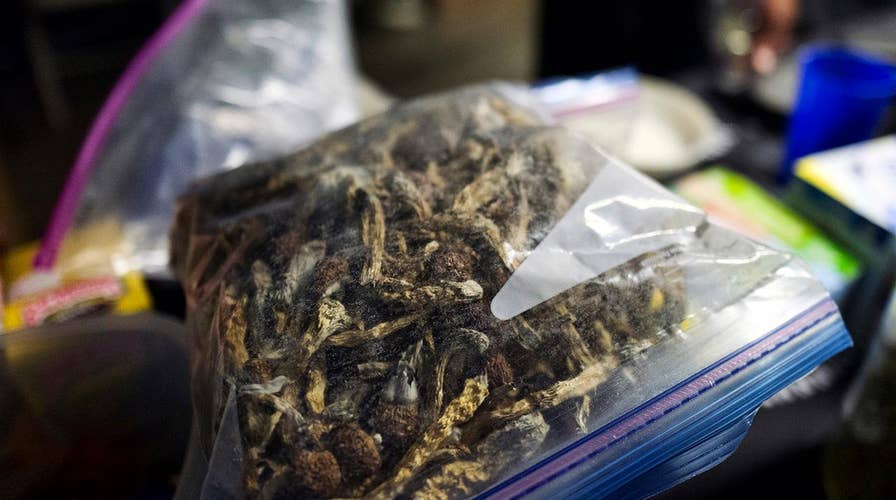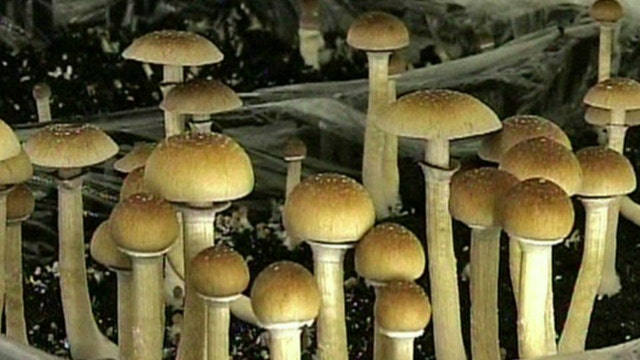Denver mulls decriminalizing hallucinogenic mushrooms
Why would a city want to decriminalize magic mushrooms? Dr. Marc Siegel explains.
Oakland became the second city in the United States to decriminalize magic mushrooms and other natural psychedelic drugs after the City Council passed a resolution on Tuesday night.
The California city joins Denver, which passed a similar measure back in May, in decriminalizing the possession and use of psilocybin – more commonly known as magic mushrooms – and other entheogenic, or psychoactive, plants and fungi for adults.
The move comes amid an apparent shift in attitudes toward the substances, with advocates touting medical benefits of what was a recreational drug used by hippies in the 1960s. During the council meeting, a string of speakers testified that psychedelics helped them overcome depression, addiction and post-traumatic stress disorder.
Use of the plants “saved my life,” said one man who described himself as a former heroin addict. “I don’t how to describe it other than miraculous.”
TWO-THIRDS OF AMERICANS BLAME DRUG COMPANIES FOR OPIOID CRISIS, NEW POLL SAYS
“Entheogenic plants and fungi are tremendous for helping to enable healing, particularly for folks who have experienced trauma in their lives,” Carlos Plazola, chair of the advocacy group Decriminalize Nature Oakland, said before the council meeting. “These plants are being recommended pretty extensively undercover, underground, by doctors and therapists.”
The vote makes the investigation and arrest of adults who grow, possess, use or distribute entheogenic plants one of the lowest priorities for police. No city funds could be used to enforce laws criminalizing the substances, and the Alameda County District Attorney would stop prosecuting people who have been apprehended for use or possession.
Councilmember Noel Gallo, who introduced the resolution, had said decriminalizing such plants would enable Oakland police to focus on serious crime.
Amendments offered by Councilmember Loren Taylor added caveats that the substances “are not for everyone,” recommending that people with PTSD or major depression seek professional help before using them and that people “don’t go solo” but seek expert guidance and have a trusted friend present during the use.
The ordinance also directs the city administrator to come back within a year to provide the council with an assessment of the law’s community impact.
Magic mushrooms would remain illegal under both federal and state laws. Entheogenic substances are considered Schedule 1 drugs under the federal Controlled Substances Act, which categorizes drugs that have potential for abuse and no medical value.
Skeptics had raised concerns about unsafe use, especially in schools.
To address such concerns, Gallo said earlier, lawmakers would have to establish rules and regulations about the use of such substances, including what exactly can be used, how to use them and what associated risks are.
While certain entheogenic substances have been used for centuries by Native American communities, the drugs were widely made illegal across the globe during the 1960s and 1970s. The tide, however, seems to be turning on these substances amid research at numerous universities into their efficacy in treating mental health issues and addiction.
CLICK HERE TO GET THE FOX NEWS APP
In an analysis published last October in an issue of Neuropharmacology, a medical journal focused on neuroscience, researchers from Johns Hopkins University recommended that psilocybin be reclassified for medical use – arguing its benefits in helping treat depression and anxiety and helping people stop smoking.
“In the 1960s, they were on the cutting edge of neuroscience research and understanding how the brain worked,” Matthew Johnson, an associate professor of psychiatry and behavioral sciences at Johns Hopkins, told the New York Times. “But then it got out of the lab.”
Johnson added that as the substances gain more mainstream acceptance for their medical uses, it could be a game changer for treating mental illness.
“I see this as a new era in medicine,” he said. “The data suggests that psychedelics are powerful behavioral agents.”
The Associated Press contributed to this report.







